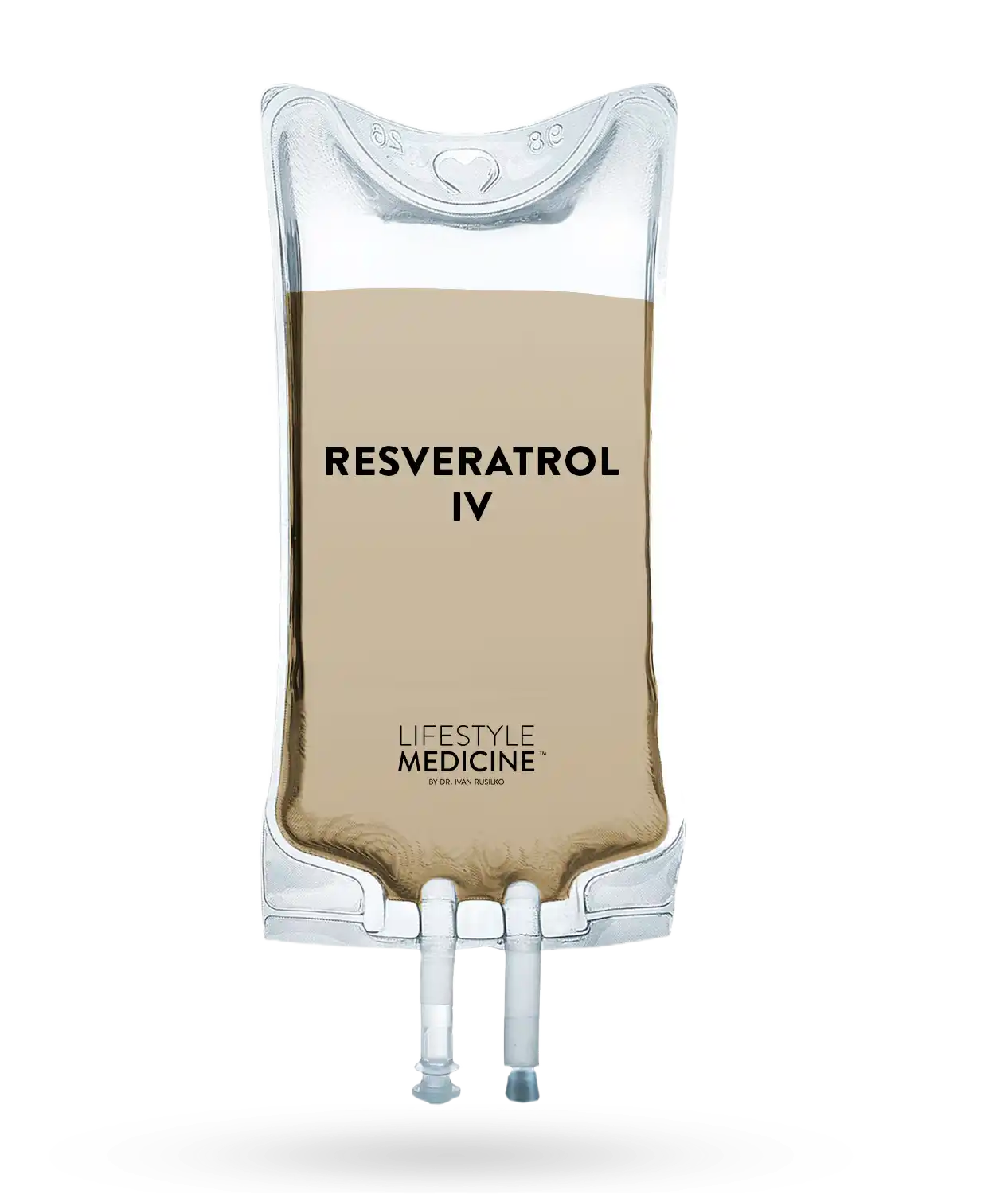
Resveratrol IV
Resveratrol IV is a cornerstone therapy in longevity medicine, specifically targeting telomere health, anti-aging pathways, and oxidative stress.

Resveratrol IV
What is reveratrol?
Resveratrol is a naturally occurring polyphenol found in red grapes, berries, and peanuts, renowned for its antioxidant and anti-inflammatory properties. Intravenous (IV) administration of resveratrol allows for higher bioavailability compared to oral intake, facilitating direct delivery into the bloodstream.
Uses in the Wellness Industry
Anti-Aging
Resveratrol activates sirtuin proteins, which are associated with cellular longevity and DNA repair mechanisms.

Cardiovascular Health
It may improve endothelial function and reduce oxidative stress, potentially lowering the risk of heart disease.

Metabolic Support
Resveratrol has been studied for its potential to enhance insulin sensitivity and support glucose metabolism, which could be beneficial for individuals with metabolic disorders.

Neuroprotection
Research suggests that resveratrol may offer neuroprotective effects, potentially aiding in the prevention of neurodegenerative diseases.
Anti-Inflammatory Effects
It possesses anti-inflammatory properties that might be relevant to chronic diseases and longevity.
Anti-Aging and Telomere Benefits
TELOMERE PROTECTION
Reduces oxidative damage and inflammation that shorten telomeres.
TELOMERASE ACTIVATION
Potentially promotes telomere elongation in specific cells.
DNA STABILITY
Enhances repair mechanisms and protects genomic integrity.
CELLULAR LONGEVITY
Mimics caloric restriction via SIRT1 activation, delaying the effects of aging.
FAQs
Resveratrol IV therapy is a cutting-edge anti-aging treatment. Its ability to protect telomeres, enhance DNA repair, and combat oxidative stress makes it a key component of longevity-focused therapies.
- Anti-Aging Protocols: Administered monthly for cumulative benefits.
- Neurodegenerative Support: Slowing the aging of neural cells.
• Skin Health: Enhancing dermal cellular repair and collagen production.
- Pregnancy and Breastfeeding: Due to a lack of sufficient safety data, resveratrol IV therapy is generally not recommended for pregnant or breastfeeding women.
- Hormone-Sensitive Conditions: Individuals with conditions such as breast cancer may need to avoid resveratrol, as it can act as a phytoestrogen.
• Bleeding Disorders: Resveratrol may have antiplatelet effects; therefore, individuals with bleeding disorders or those on anticoagulant therapy should exercise caution.
- Frequency:
- For anti-aging and wellness benefits, it is often administered once every 2-4 weeks.
- For acute support (e.g., oxidative stress or recovery from illness), it may be given weekly for 4-6 weeks before tapering to a maintenance schedule.
- Treatment plans are typically customized based on individual needs, age, and pre-existing conditions.
- Resveratrol vs. EGCG IV:
- Similarities:
- Both are antioxidants with anti-inflammatory and cardiovascular benefits.
- Both protect against oxidative damage and improve mitochondrial function.
- Differences:
- Resveratrol is more directly linked to telomere health and anti-aging through SIRT1 activation.
- EGCG focuses more on metabolic health, weight management, and brain health due to its thermogenic and neuroprotective properties.
Use Case: Resveratrol is favored in longevity protocols, while EGCG is often used for weight loss and cognitive enhancement.
- Resveratrol vs. NAD+ IV:
- Similarities:
- Both support mitochondrial function and combat aging.
- Both are linked to cellular repair and DNA protection.
- Differences:
- NAD+ directly replenishes cellular energy (ATP) and repairs DNA damage.
- Resveratrol activates SIRT1, which indirectly enhances NAD+ activity but also focuses on telomere health.
Use Case: NAD+ IV is used for energy restoration and neuroprotection, while resveratrol is a gentler option targeting long-term telomere maintenance.
- Resveratrol vs. Vitamin C IV:
- Similarities:
- Both reduce oxidative stress and enhance immune function.
- Both improve skin health and collagen production.
- Differences:
- Vitamin C is a general immune booster with immediate effects.
- Resveratrol offers more specialized anti-aging and telomere-related benefits.
Use Case: Vitamin C IVs are ideal for acute immune support, while resveratrol is more focused on longevity.
- Resveratrol vs. Glutathione IV:
- Similarities:
- Both are powerful antioxidants that protect against cellular damage.
- Both support detoxification and anti-inflammatory pathways.
- Differences:
- Glutathione works directly to detoxify the liver and reduce oxidative stress.
- Resveratrol influences cellular aging pathways and telomere health.
Use Case: Glutathione IVs are preferred for detox protocols, while resveratrol is better for systemic anti-aging.

